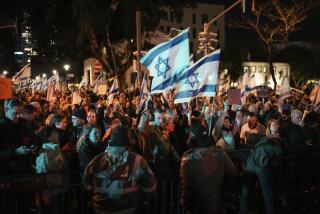U.N. Chief Seeks to Pressure Iraq in Talks : Asks 5 Nations to Urge Baghdad to Break Deadlock With Iran
- Share via
GENEVA — U.N. Secretary General Javier Perez de Cuellar on Monday asked the United States and the four other permanent members of the U.N. Security Council to pressure Iraq to break a deadlock in the Iran-Iraq peace talks, diplomatic sources said.
Perez de Cuellar met with representatives of the United States, the Soviet Union, Britain, France and China on Monday morning after the talks bogged down over the Shatt al Arab, the waterway that forms the southern border between Iran and Iraq.
Baghdad insists that the waterway be totally under Iraqi control. Iraqi Foreign Minister Tarik Aziz said at a press conference Monday that until the waterway is cleared of mines and wreckage and freedom of navigation is restored, Iran will benefit unfairly from the cease-fire that has been in effect since Aug. 20.
‘Only Outlet to the Sea’
“The Shatt al Arab is Iraq’s only outlet to the sea,” Aziz said. “Iran has already started using its ports and its long seacoast for trade . . . so it has benefited from the cease-fire.”
He charged that Iran has shown bad faith in the peace talks that opened last week and added, “We are still only at square one.”
U.N. officials have told U.S. and other diplomats here that Iraq, not Iran, has been blocking the talks. Iraq considers itself the winner of the war and wants the Shatt al Arab as a trophy of victory, diplomatic sources said.
Concessions Granted
Last fall, when Iraq’s military position was not so advantageous, Baghdad agreed to a U.N. plan that granted Iran concessions on the waterway issue.
Now, Iranian negotiators have wrapped themselves in the mantle of the United Nations, regularly referring to the “guidance” and “leadership” of Perez de Cuellar, while Iraq finds itself fighting with the United Nations rather than with Iran.
The talks have made little progress on the key issues, including a phased retreat of military forces from their positions and an exchange of prisoners. The bitterness is so deep that the Iranian and Iraqi delegations have refused to share a large restroom between their private conference rooms.
But despite the impasse, Western diplomats point out, neither side has issued an ultimatum or threatened to walk out of the talks.
Aziz, after criticizing Iran for negotiating in bad faith, said he had no plans to leave.
Enjoying Geneva
“I am enjoying my stay here in Geneva,” he said. “I am prepared to stay here as long as the mission requires.”
U.N. officials do not seem to be concerned. The longer the talks go on, they feel, the less likely it is that the cease-fire will be broken and the more accustomed to peace the two sides will get.
Already, in unofficial currency markets in Baghdad and Tehran, the rial and the dinar have almost trebled in value against the dollar. This gives the people more buying power, especially where foreign goods are involved, and it makes for a popular reluctance to resume the war.
“Even if nothing happens,” one official said, “the important thing is that the cease-fire holds. I think it will hold.”
More to Read
Sign up for Essential California
The most important California stories and recommendations in your inbox every morning.
You may occasionally receive promotional content from the Los Angeles Times.













